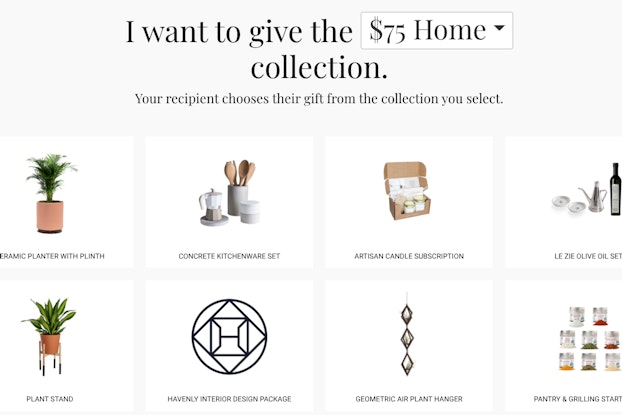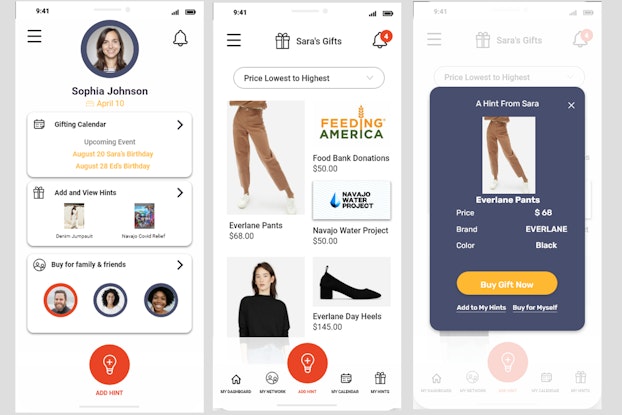
Online shopping makes it easy to buy for yourself, but creates challenges for gift givers.
How do you send a gift that feels truly personal?
How can a company send the same gifts to dozens, or hundreds, of clients without having to enter every order, and shipping address, one at a time?
How can you pick something the person wants from the millions of choices available online?

Interested in a small business membership?
Find out how the U.S. Chamber of Commerce can help your company grow and thrive in today's rapidly-evolving business environment. Connect with our team to learn how a small business membership can benefit your bottom line and help you achieve your goals.
Forty percent of consumers plan to purchase more gifts this year due to the pandemic in order to spread more joy during a tough 2020, research firm The NPD Group reportedin early November.
Marshal Cohen, NPD analyst, predicted in the report that “guilt-gifting” — gifts triggered by regrets about missing traditional holiday gathering — will drive sales this year. He noted that “opportunities for growth lie in the innovative options that help consumers create the holiday cheer they are craving.”
Joe Fischer of Greetabl, Sara Rodell of Loop & Tie and Eddy Jette of GyftHint, spoke with CO— about the digital gifting solutions these disruptors have created, and how demand for their solutions has increased as companies, family and friends are using gifts to make connections during the pandemic.

Greetabl: Making the card part of the gift
Joe Fischer founded Greetabl eight years ago when he saw a need for an easy way to send personalized greetings, combined with small gifts to say, “thank you,” “congratulations” or “thinking of you.”
What if, he asked, the card was part of the gift, and the gift was part of the card?
He created a patented, combination greeting card and gift box that can be customized with pictures and a personal message, and folded to hold a candle, candy, photo frame, ornament or other small gift.
Most of the gifts sent by Greetabl fall in the $20 to $30 price range — the sweet spot that Fischer says fills “the gifting gap — more than a card, less than flowers.”
Greetabl has seen demand for “thinking of you” and “miss you” gifts surge during the pandemic.
“It really felt like we became a real need this year,” Fischer told CO—. “Gifting is an inherently social, inherently human behavior, but this year we really saw that exemplified in a very big way when people couldn’t physically be together.”
The company also saw that mini bottles of hand sanitizer became popular gifts to include in a “miss you” message.
Gift givers can opt to use Greetabl to send a gift card with a personalized message from Target, Nordstrom, Starbucks, Uber Eats or two dozen other retailers.
The company doesn’t release sales figures, but it has seen a 117% increase in traffic to its website, year over year, and it more than doubled its staff this year, from four full-time employees to 10.
Most of the Greetabl purchases are gifts from individuals to family and friends, but the company is seeing an increase in companies placing orders for dozens or even hundreds of gifts.
“I expect corporate sales will take a huge leap in 2021,” Fischer said. “The forward-looking companies out there are thinking about how do you build that community, those personal connections, that loyalty,” he said.
Greetabl has seen demand for “thinking of you” and “miss you” gifts surge during the pandemic.

Loop & Tie: A solution for corporate gifting
Sara Rodell was working at an investment bank and volunteered to take charge of selecting and ordering gifts for corporate clients. That experience led her to found Loop & Tie.
“Most online processes are designed for a single buyer buying for themselves,” Rodell told CO—. “E-commerce is not really designed around gifting, which is a very different interaction.” Online checkout platforms aren’t set up to allow someone to easily send the same gift to multiple addresses, or to send a gift when you don’t know the recipient’s home address.
Loop & Tie, based in Austin, Texas, solves those problems, and also lets gift recipients select their gift from an assortment of items.
Recipients receive an email with a message from the gift giver that asks them to pick a gift from an assortment offered by Loop & Tie. The recipient then enters their shipping address and receives the gift they chose.
Corporate gift givers can choose the price of the gifts offered; the recipient doesn’t see the price or know that they are selecting gifts from the $75 collection. Most of the corporate customers spend in the $50 to $150 range. Companies can also create their own gift selections or opt for the premium $500-plus collections.
While individuals can use Loop & Tie to send a gift to one recipient too, the company focuses on the corporate gifting space “because that’s where we feel the need is most acute and there’s a significant opportunity there for offering individualization at scale,” Rodell said.

Loop & Tie is seeing an increase in companies sending holiday gifts to their employees this year. Companies that have had to cancel traditional holiday parties are sending gifts instead.
The brand’s platform, where you only need a person’s email to send a gift, is filling a specific need this year, with so many people working remotely. “This year with the movement to the virtual office, nobody knows anybody’s addresses,” she said.
When the pandemic began, Rodell worried about the impact on corporate gifting, but discovered 2020 has been a year of significant growth for the company.
“We really saw companies double down – both in terms of reaching out to clients and really thanking their employees. What I’m seeing is this feeling of wanting to feel connected,” Rodell said.

GyftHint: Creating a digital wish list
Eddy Jette founded GyftHint, an app designed to make it easier for gift-givers to buy friends and family exactly what they want, because he was a frustrated gift buyer and gift recipient.
“It got to the point where I was going out and buying my own gift, giving it to my wife, and she’d wrap it up and give it back to me for Christmas,” Jette told CO—.
“Why in this day and age am I struggling to figure out what to give my niece for her birthday?” he said.
The GyftHint app allows consumers to invite family and friends to create wish lists of online products. The gift giver can access those lists, make a purchase and have it shipped directly to the recipient, with GyftHint placing the order and collecting payment.
GyftHint currently makes money through affiliate commissions it earns from purchases it directs to other retail sites. Jette has plans for retail partnerships that would generate additional revenue.

Jette isn’t the typical retail tech entrepreneur. He created GyftHint as he was preparing to retire after 25 years in the insurance business.
He launched the app last year with a few hundred users to test his idea. GyftHint processed about 3,000 holiday gift transactions last December, with a return rate of less than 1.5%.
Now, with an upgraded app and a social media campaign, they are preparing to make a bigger push in 2021, with a goal of scaling to 100,000 users.
GyftHint’s goal, Jette said, is to make gift ordering as convenient as buying on Amazon, with the option of buying from any retailer.
“We want retailers to be promoting this platform to their customers, because they’re losing the battle when it comes to convenience,” he said. “It’s time to bring a centralized platform for gifting that doesn’t exist now.”
CO— aims to bring you inspiration from leading respected experts. However, before making any business decision, you should consult a professional who can advise you based on your individual situation.
Follow us on Instagram for more expert tips & business owners stories.
CO—is committed to helping you start, run and grow your small business. Learn more about the benefits of small business membership in the U.S. Chamber of Commerce, here.







